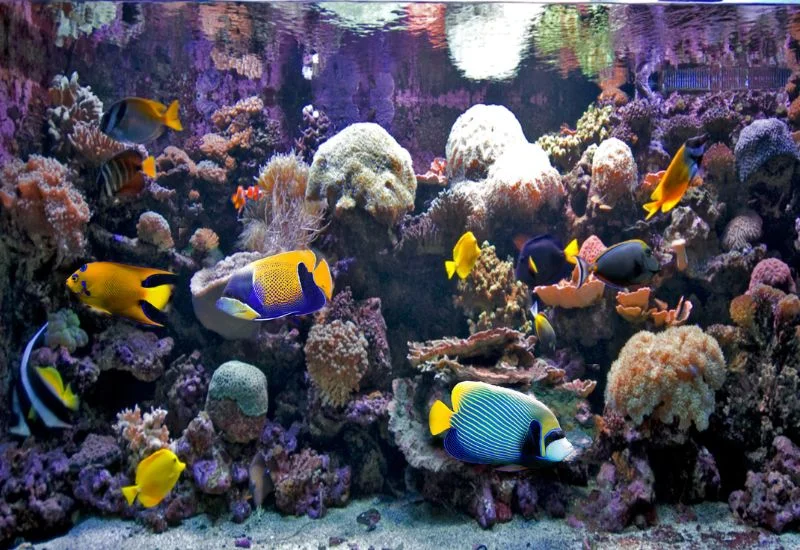Managing the aquatic life of an aquarium involves more than just caring for plants and fish. The feeding habits of the fish plays the vital part.
Overfeeding the fish is a common problem every aquarist faces; it causes several issues. For example, causing disease to fish, poor water quality, stress in fish, growth of algae, and an increase in harmful chemicals in water.
All these issues can be eliminated by providing proper and timely meals to your fish. Here is the guide on the signs and impacts of overfeeding.
Reasons of Overfeeding
People normally overfeed the fish by thinking the fish diet is the same as humans:
- Fish don’t eat in large portions as humans do; the fish diet consists of small meals
- People use food as a form of communication and overfeed the fish
- Fish show excitement when you go near aquariums. People tend to feed them more than usual for fish’s excitement
Signs of Overeating in Guppies
- Waste tangling around the fish can be a sign of a blocked intestine
- The increase in cloudy water
- The male guppies develop bulging chests or potbellies because they have too much fat in their diet
Signs of Overeating in Goldfish
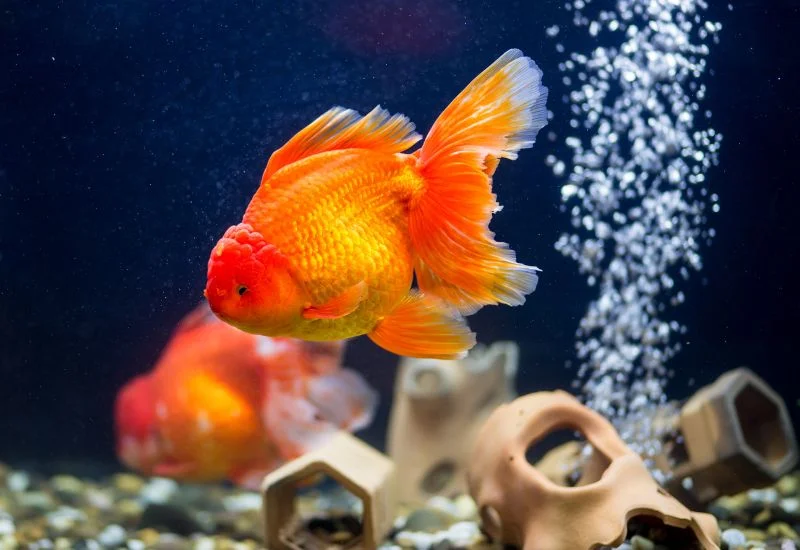
- Goldfish eat whenever food is available. It is up to the individual to control the amount of food
- The overeaten goldfish’s abdomen will swell and have difficulty swimming
- Goldfish can develop buoyancy issues; they will float away or upside down
- The goldfish can be more lethargic and spend more time at the bottom of the tank
Signs of Overeating in Betta Fish
- Betta fish can eat more, so overeating can be a common problem.
- Look for swelling near the stomach.
- There can be a change in the behavior; the fish can be less active.
- Betta fish will be spending more time resting.
- The fish can have digestive issues that can cause the problem of diarrhea or constipation.
Impact of Overfeeding the Fish
Water Quality Issues
Providing too much food will result in leftovers that remain uneaten. The uneaten food will start to decompose in the water which will cause rise in the ammonia, nitrates, nitrites. These chemicals will reduce the water quality of the aquarium. The poor water quality will cause sickness to the fish.
Health Problems For Fish
Overfeeding your fish can cause several health problems. Here is the list:
Low Oxygen Level
Uneaten food consumes oxygen for decomposition and produces carbon. The amount of carbon reduces the oxygen level in the water for fish.
Fin Rot
Overfeeding can cause stress to the fish and imbalance in the water. In result, the fish develop fin rot that looks bushy and worn out.
Fatty Liver
Some species of fish, like African cichlids and rainbowfish, can develop the diseases of fatty liver due to overeating. This disease can cause massive health problems or even kill them.
Bloated Bellies
The other problem that can be caused by overeating is the bloated bellies of fish. This is the sign of indigestion.
Impact on Aquarium Ecosystem
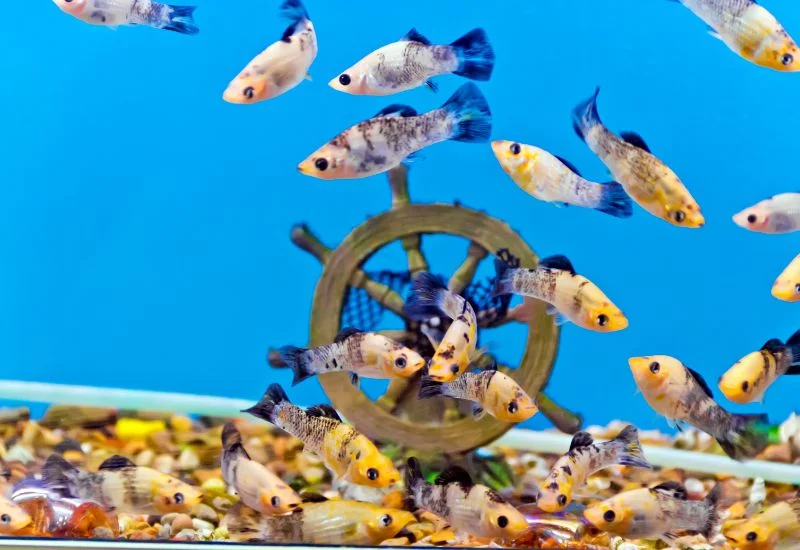
Uneaten food can elevate the growth of algae in the water, which will reduce the quality of water.
- The pH level of water can be affected.
- There can be changes in the water temperature.
- Overfeeding can cloud the water, which can cause health problems.
- The amount of harmful organic matter can increase.
- Planaria, the small tank worms, are a sign of overfeeding.
- The matter is produced by the decomposition of uneaten food stuck in the aquarium filters. This will impact the whole aquarium environment by causing changes in the water condition.
Common Signs of Overfeeding
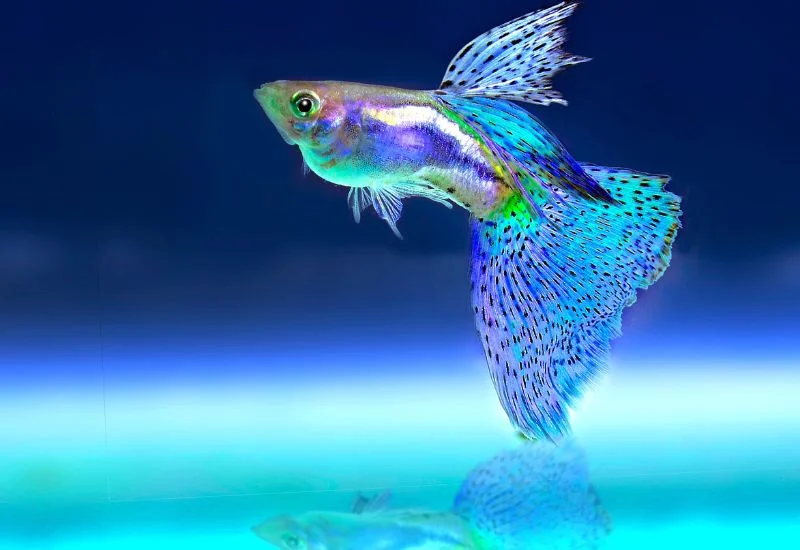
- If food remains in the tank after 5 minutes of feeding, this is a sign of overfeeding.
- The growth of blue and red algae is a sign of decomposed matter in the water due to overfeeding.
- The behavior of fish can be changed. The fish cloud is more lethargic than usual.
- The scales of fish will be scratched and will shape fish like pinecones, which is a sign of overfeeding.
- The uneaten food will float on the surface of the aquarium, Take it out with the help of a net.
- Uneaten food may cause murky water that promotes bacterial and algal growth. The color of the water can change, and it may have a foul smell.
- Dirty aquarium gravel indicates the presence of uneaten food
- If your fish is avoiding their meals, it means they are already full. This is a sign of overfeeding.
How to Correct Overfeeding
- To correct the feeding patterns of the fish, know about the species you have
- The amount of feed depends on the type of species
- Feed your fish according to their recommended needs
- Set a timer and give food at the same time daily
- If the amount of food is increased in the aquarium, take a siphon and remove 25% of the water from the aquarium
- This will remove debris from the surface and reduce the amount of food in the water
- Before giving the food, measure the food portion as per the recommendation
Preventing Overfeeding in the Future
- Knowledge about the fish species you have and their food requirement
- Feed your fish in small portions to know how much fish eat
- Observe the eating pattern; the food that is left after the five minutes of providing might never be eaten
- Use good filters to cope with decomposition to have better water quality
- You can use the automatic feeder. It will provide the recommended quantity of food and will release the food in the aquarium.
Monitoring of Feeding Habits of Fish
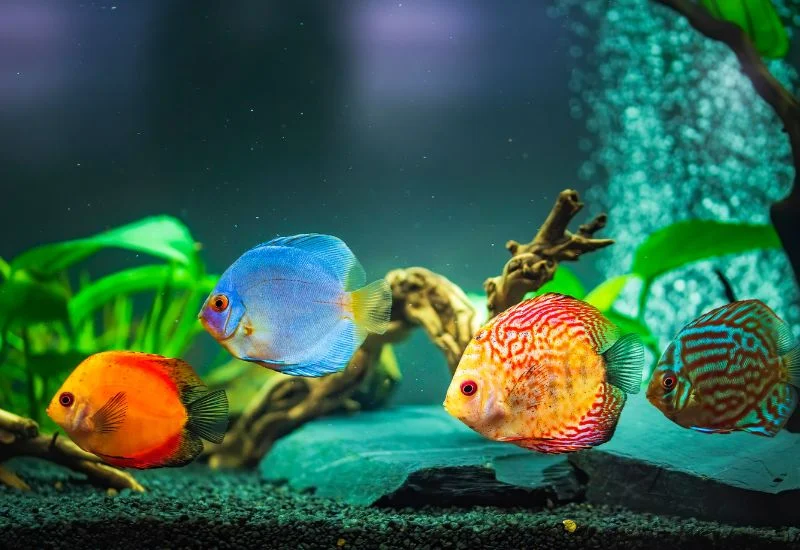
- By using the rule of thumb, if the food is finished within 2 to 3 minutes, the amount of food is appropriate; if the food is left, it might be overeating.
- Another method is a feeding ring. This keeps the food in the box, and you can check what is eaten and what is left.
- In this way, there will be no food spread in the tank.
- Another strategy you can use is feed the food on schedule time and observe the fish if there’s any lethargic behavior that might be a sign of overfeeding.
Conclusion
Overfeeding fish is a common habit developed because it’s the way we communicate with the fish. Fish know the time of feeding and when you approach them they come up to the surface of the aquarium for food. Overfeeding does not make them happy but it can cause them massive health issues. It can develop several diseases like fin rot, fatty liver, swell abdominal and indigestion.
Overfeeding can cause changes in the environment of the aquarium by affecting the water quality, change in the water pH and temperature, clogged filters, increase in the amount of harmful bacteria, growth of algae, cloudy water, and many more.
These all issues can be eliminated by monitoring the feeding habits of the fish. Know about the species of fish you have and their needs. Feed them on schedule time and give food in small portion. Monitor the aquarium for any uneaten food and try to clean it instantly for the good quality of water.
